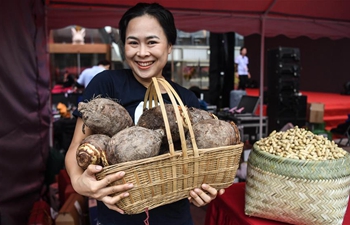
A vendor prepares a backpack at a market in Quezon City, the Philippines, Jan. 7, 2020. The Philippines' inflation accelerated to 2.5 percent in December 2019, bringing the full-year 2019 inflation print to 2.5 percent, the Philippine Statistics Authority (PSA) said on Tuesday. (Xinhua/Rouelle Umali)
MANILA, Jan. 7 (Xinhua) -- The Philippines' inflation accelerated to 2.5 percent in December 2019, bringing the full-year 2019 inflation print to 2.5 percent, the Philippine Statistics Authority (PSA) said on Tuesday.
The latest figure was well within the government's full-year target, the PSA said, adding that the inflation was observed at 1.3 percent in November 2019 and 5.1 percent in December 2018.
"This was mainly driven by the uptick in the prices of both food and non-food items due to the impact of typhoons and rising oil prices recorded during the month," PSA Deputy National Statistician Rosalinda Bautista told a news conference.
According to Philippine Socioeconomic Planning Secretary Ernesto Pernia, the full-year 2019 inflation was well within the government target band of 2.0 to 4.0 percent.
"The country ended last year with steady inflation but the government must remain vigilant and proactive in managing the impact of potential sources of price pressures this year such as typhoons, the continuing presence of African swine fever (ASF) in the country, and the heightened conflict in the Middle East," Pernia said.
Pernia stressed the need to immediately implement the recovery and rehabilitation plans for the typhoon-affected areas and to fast-track the production support programs for the affected farmers and fisherfolk.
"Over the medium to long-term, the agriculture, forestry, and fisheries sector must increasingly adopt climate and disaster-resilient technologies and best practices. Climate and disaster risks should also be considered in the program and project designs in the sector," Pernia added.
He also stressed the need to focus on other priority areas such as assisting farmers to shift to high-value, short-maturing, and high-yielding crops; and sustaining biosecurity measures and procedures until the ASF is fully eradicated. "This will bring back the confidence of consumers in pork products," he added.
Pernia cautioned that the escalating tension in the Middle East may disrupt global oil supply which could lead to a surge in the prices of petroleum products and overall inflation.
"The government should effectively manage expectations at the domestic front and be vigilant against any unwarranted increase in pump prices considering that the last tranche of excise tax increase on fuel products will be implemented this month," he added.











